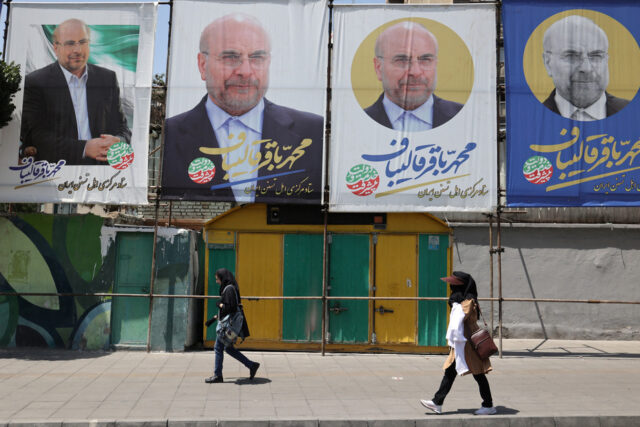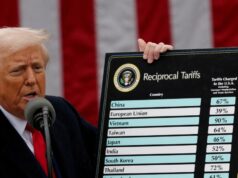Iran votes for a new president today, almost forty days after the death of President Ebrahim Raisi and foreign minister Amir Abdollahian, in an air crash.
There are three main contenders. The first is Tehran’s former Mayor and current Speaker of Parliament, Mohammed Bagher Ghalibaf who ran for the post in 2005, 2013 and 2017. The sole reformist candidate is Masoud Pezeshkian, a 69-year-old heart surgeon who has the support of former foreign minister Mohammad Javad Zarif.
The third is Said Jalili, a seasoned politician who has been Iran’s nuclear negotiator and is close to Iran’s Supreme leader Ayotollah Ali Khamenei.
The presidential elections were scheduled for 2025 but were moved up following Raisi’s death. A hardline cleric, 63-year-old Raisi who was elected in 2021 for a four year tenure, was seen by many as successor to 82-year-old Khamenei.
Early this month, the Guardian Council, a 12-member supervisory body of clerics and jurists overseen by Khamenei, approved five conservative candidates and a reformist candidate from an initial pool of 80, to run for president.
Two candidates withdrew from the race ahead of voting day: Amirhossein Ghazizadeh Hashemi, 53, who served as one of Raisi’s vice presidents, and Tehran Mayor Alireza Zakani.
Under the 1979 Iranian Constitution, only a male candidate can run for the presidency. The winning candidate must get 50 per cent plus one vote of the total votes cast, to avoid a run-off. Reformist candidates have won as presidents with landslide victories and high voter turnout in 1997, 2001, 2013 and 2017.
A vote against the clerical establishment is accompanied by a very high voter turnout. If people are not hopeful of change, they do not come out to vote as in 2005 and 2021 when Ahmadinejad and Ebrahim Raisi won respectively.
Although reformist presidents in Iran have outnumbered conservative presidents in the last 27 years, the hardliners’ control over all the other organs of government has become stronger since 2003.
Early this week, Iran’s supreme leader, Ayatollah Ali Khamenei issued a veiled warning to the sole reformist candidate, saying anyone who believes “all ways to progress” come from the United States, should not be supported.
In the backdrop of exceptionally low voter turnout in the parliamentary election in March, candidates are warning of voter apathy this time also. Frustration is widespread given inflation and unemployment. The economy has been hit hard by years of western sanctions. Reports indicate that voters are not sure whether exercising their franchise would serve to address economic concerns.
At a cabinet meeting on Wednesday, Iran’s Acting President, Dr Mohammad Mokhber drew attention to emphasis put by the Supreme Leader about the importance of maximum participation in the upcoming elections.
At a meeting with a large group of people on June 25 on the auspicious occasion of Eid al-Ghadir, Khamenei said, “The reason for the insistence and emphasis on maximum participation in the elections … is that it brings honour to the Islamic Republic. People’s participation is a part of the essence of the Islamic Republic. The most important demonstration of this is in the elections.’’
He criticized the belief held by certain politicians that progress can only be achieved by relying on foreign powers and the illusion that the U.S. is the only path to development. The Iranian nation will not permit others to determine its fate in the future either.
Professor Kingshuk Chatterjee of the University of Calcutta who specializes in Iranian politics, says the outcome of the elections will be crucial for India.
‘’Historically, Iran has been one of largest suppliers of crude to India and much of India’s refinery capacity is suited to Iranian crude. India has had to reduce import of Iranian crude on account of international sanctions imposed on Iran.’’
In his view, India stands to gain from a Reformist victory.
“Although India also has friends in Iran’s hardline establishment, it suits our interests more if there is a reformist comeback. Let us not forget that negotiations on the Chabahar port began in 2003 under a reformist regime. The initial two agreements were signed by the then Iranian President Hassan Rouhani.
“Although India signed a contract to operate Chabahar in May this year, there is a section of politicians among the hardline establishment that feels India should be penalised for its proximity to the United States. The saving grace is that there are still some pragmatic voices among the hardliners, who favour a closer Indian association with Iran,’’ he said.
Dr Iraj Elahi, Ambassador of Iran, recently said “Ayatollah Raisi played a very important role in expanding relations between Iran and India, and certainly, this process will continue after him as well.’’
India on May 13 signed a 10-year contract to operate the strategic port of Chabahar that will help expand trade with Central Asia. Chabahar is Iran’s largest ocean port and part of the north-south transit corridor in southeastern Iran.
Tehran has also introduced a 15 day visa free policy for Indian tourists, signaling not only trust but also that it is open to business with Delhi.
Delhi based journalist pickled in journalism. Have reported from nine world capitals and almost all parts of India. Over the last three decades, I have worked for India’s mainstream English dailies and contributed to All India Radio, Doordarshan and Women’s Feature Service. Also worked for international media including Japan’s leading newspaper, The Asahi Shimbun and done assignments for The Sunday Times, London, The Telegraph, The Guardian and the Canadian Broadcasting Corporation. Worked in the Embassy of France in New Delhi and can speak French to save my life. Write on Diplomacy, Politics and the social sector. Love Nature, heritage, Nature, animals and vintage cars. Enjoy cycling and playing badminton.





